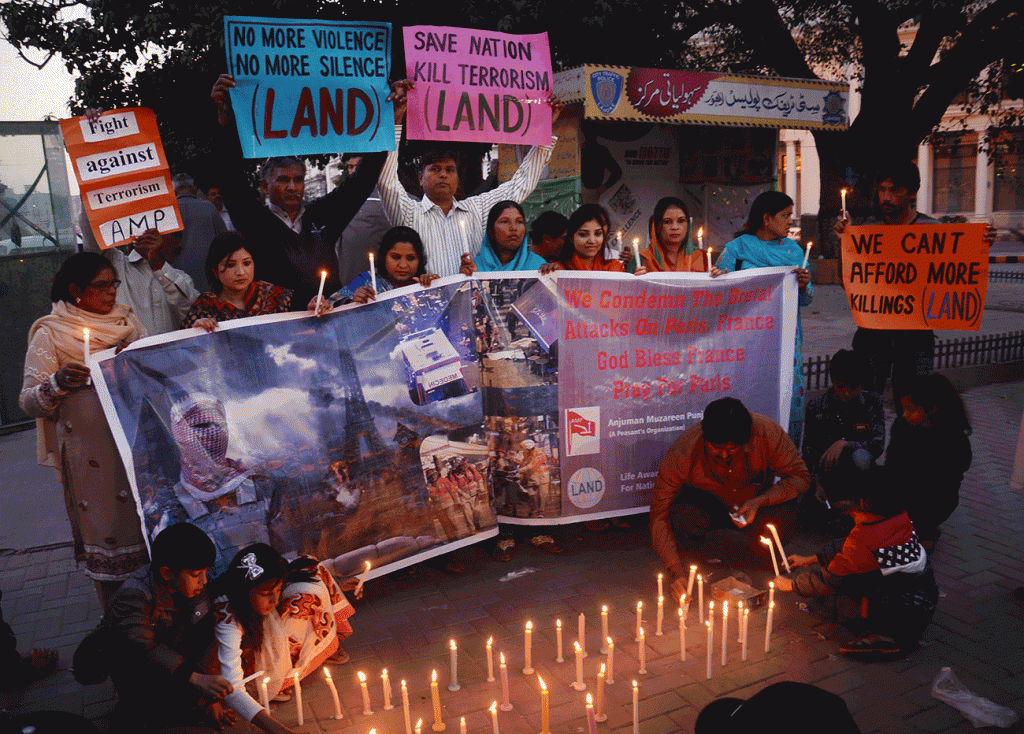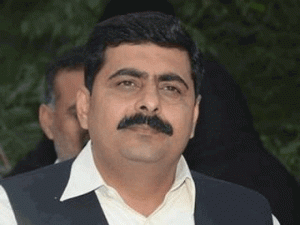This Land is Our Land: Peasants in Okara fight for their rights.
By Kunwar Khuldune Shahid | Newsbeat National | Published 9 years ago
Over a century ago, the British government relocated peasants and farmers from what is now Indian Punjab in the east to West Punjab to take care of military farms. The Punjab Board of Revenue leased around 160,000 acres of land to the peasants. Following Partition, the military lands were divided among the Indian and Pakistani armies. According to reports, military farms span over 68,000 acres in 10 districts of Punjab as things stand, with around one million farmers.
The Military Dairy Farm in Okara was set up in 1913. The British government allowed the local farmers to continue their tenancies. The land was leased out to the army for 20 years. The lease expired in 1933 and was never renewed, but the land continued to remain under army possession. Okara’s military farms now engage almost 200,000 farmers.
After Partition, the local battai system continued in all military lands with the army, with the farmers taking their respective shares in the yield. Under the Musharraf regime in 2000, the army tried to introduce rent to replace the battai system. Under the Punjab Tenancy Act, 1878 those living on a particular land for generations have the first right over it. Agreeing to Musharraf’s proposal would’ve meant permanently handing over ownership to the army.
This led to the formation of the Tenants Association of Punjab or Anjuman Muzareen Punjab (AMP) that took up the fight for the rights of the landless peasants of the province. For the past 16 years, the AMP has been striving to get ownership of land for those peasants who have lived and worked there for over a hundred years.
On April 14, Mehr Abdul Sattar, the AMP General Secretary, was delivered an official notice at his residence in Chak 4/4 L, Okara. The notice, signed by the District Coordination Officer (DCO) Sucrat Aman Rana, forbade Sattar and AMP from organising their scheduled convention on April 17.
“There are reports that you are organising a convention on 17.04.2016 in support of your demands without seeking prior permission from the competent authority which is cognisable under Section 141 of PPC 1860 and tantamount to legal action against the perpetrators,” the notice addressed to Sattar read. “Moreover, under the National Action Plan, the Government of Punjab is not allowing any such unlawful assembly to breach tranquility and put at stake the lives and property of the people of the area. In view of that an Order under Section 144 Cr.PC in apprehension of public nuisance and danger to lives has already been issued,” it continued.
“The National Action Plan is being misused to prevent peasants from celebrating International Peasants’ Day. We condemn this attempt by the District Commission Officer (DCO) Okara to create disharmony between honest and hardworking peasants and state institutions,” Mehr Abdul Sattar wrote on his Facebook page on April 15.
Elite force personnel arrested Sattar from his home on April 16. The arrest prompted hundreds of peasants to come out to GT Road in protest. Eyewitnesses confirmed that armed military men and tanks were sent to GT Road to counter the protests.
“Sattar called me on the night of April 15 around 11:45pm and told me that army tanks and other vehicles are moving around the villages,” says Awami Workers Party (AWP) General Secretary, Farooq Tariq. “The tanks were supposed to frighten the villagers ahead of the convention.”
“I asked Sattar if he can take care of himself and not be arrested. He replied, ‘I have no choice, I will be at the peasants convention,’” Tariq adds.
Sattar is the fifth leader of the peasant movement to be arrested after Nadeem Ashraf, Malik Salim Jakhar, Shabir Ahmad Sajid and Hafiz Jabir. A week before the scheduled convention, the two groups of the movement in Okara joined hands and agreed to work together. Okara Tenants Chairman, Liaquat Ali, and President, Mohammed Khushi Dola, had personally invited Sattar and Younis Iqbal to Chak 45.
Despite the crackdown, the AMP organised the convention on the International Day of Peasants’ Struggle on April 17. Thousands of peasant activists gathered in Okara and Dipalpur demanding an end to state-sanctioned violence and the release of Mehr Abdul Sattar. Speakers at the convention protested against the ‘unjust control of land by military-run companies’ and the ‘blackout on the electronic media.’
 “Peasant women were confronted by the military officials at Okara Military Farms while protesting against the arrest of Mehr Abdul Sattar,” says Asim Raza Dogar a local resident and activist. “The army surpassed all limits of brutality when they sent tanks and guns to target their own citizens, many of whom were injured.”
“Peasant women were confronted by the military officials at Okara Military Farms while protesting against the arrest of Mehr Abdul Sattar,” says Asim Raza Dogar a local resident and activist. “The army surpassed all limits of brutality when they sent tanks and guns to target their own citizens, many of whom were injured.”
While thousands continued to protest against Sattar’s arrest, army and police officials began using tear gas, rubber bullets and aerial firing. Many were injured during the firing, with Sabir, from Chak 4/4 L, dying after being hit by a tear-gas shell.
“Two police officials hit me with sticks. They injured me,” says one of the injured female peasants. “One of them told the other official to ‘throw her in the police van.’ They kept on hitting me. They asked me to go sit in the car — I said I won’t. And then I just lay down on the ground with my head down. Then an army official came and asked the officers, ‘Why are you hitting the old woman?’ Then they let me be.”
On April 18, Saddar and Cantt police registered separate cases against over 4,000 tenants. An FIR was then registered against over 2,000 unidentified tenants of military farms with 96 of them nominated.
The FIR claimed that “tenants tried to block GT Road and spread panic in the area by firing indiscriminately that injured lady constables Malka Zahra, Aliya, sub-inspectors Akbar Javed and Saeed Khan and constables Arshad and Tauseef.”
At 3 am on April 19, police raided the home of Chaman, a young AMP activist. When the officials found out that he was not home, five people, including two of Chaman’s brothers, were arrested. On the same morning, Mehr Abdul Sattar was shifted from Sahiwal Jail to Kasowal Military Cantonment in Khanewal. Local activists believe that Sattar was shifted to allow the military to take control of the case, resulting in the peasants fearing for his life.
On April 21, the Lahore Anti-Terrorist Court (ATC) refused to accept a public prosecutor’s argument that five of the arrested peasants should be charged under anti-terrorist laws. “A demonstration is not a terrorist activity and no damage to any public sector building or personnel has been reported,” said defence advocate Habib Rehman. The judge ordered that the Anti-Terrorism Act (ATA) charges be deleted from the FIR and asked the Okara police to present them to the local judge.
Five days later, a day-long protest was organised by AWP and AMP at Lahore’s Shimla Pahari to press for the release of peasant activists and end the crackdown on their villages in Okara. The participants said dozens of activists, including leaders Mehr Sattar and Shabbir, had been detained under ‘colonial-era laws,’ citing the Maintenance of Public Order Ordinance. Following the camp, a seven-member AMP delegation visited the CM Secretariat and was assured that the provincial government was taking notice of the crackdown.
While the focus had been on the Okara farmlands, the security forces had begun operations elsewhere as well. “The lands for Khanewal’s BCG Farms and Jehangirabad’s livestock farms, which have been with British companies on lease, were cultivated by the local peasants. But the army officials and powers-that-be have their eyes on them,” says Khanewal-based journalist, Muhammad Aamir Hussaini. “There’s an operation going on here, with Revenue Department officials and police personnel seen in these areas as late as 3 am.”
On April 28, 24 peasants were presented before the Lahore ATC. These included two women, Sughra Bibi and Akbari Bibi, both of whom are differently-abled and cannot walk. Two students were also among the 24 arrested peasants. On April 29, Jamila Begum, the leader of Dehra Sehgal peasant struggle, was arrested from Sheikhupura.
“The PML-N government has miserably failed to implement labour laws. Minimum wage is not paid and social security cards have become a dream for the working class,” said Farooq Tariq while addressing a May Day rally in Toba Tek Singh.
On May 11, the power supplies of Chak 4/4/L and 12/4/L in Okara were cut off for nearly two days on the orders of the District Police Officer, Okara. “The power supply was cut off to target electricity defaulters in the village,” the DPO said.
Farooq Tariq claimed there were less than 10 people who had not paid the electricity bills. “The real reason for cutting the power supply is the ongoing clash, where most of the AMP is being targeted by the DPO, with dozens of fake FIRs being registered against peasants under anti-terrorist laws.”
On May 20, police in Lahore prevented activists from demonstrating at Shimla Pahari. Two vans full of peasants were dispatched towards Thokar Niaz Baig. On the same day, the Senate referred the Okara farmlands issue to the Human Rights Committee.
“The security officials are targeting women and children in the name of the National Action Plan,” says AMP Chairman Liaquat Ali. “They were beating us on our international day — the one day that should have been about us and our rights.” “Our only crime is our struggle for land rights and a fair distribution of agricultural resources. The actions of the state authorities violate Pakistan’s constitution and international human rights conventions that have been ratified by the government,” he adds.
“It seems there are no law enforcement agencies functioning in Okara but gangsters roaming around and picking up anyone associated with the AMP, a genuine poor peasants’ organisation struggling for their land rights,” says Farooq Tariq. “The peasants are not terrorists. They are victims of state terrorism. They have lost at least 11 comrades in the struggle. The real issue is that the army wants to take back the land from the peasants and we will not let that happen,” he adds.
“Benazir Bhutto and Nawaz Sharif had in the past assured the peasants that they would be given ownership rights to the lands their families
had cultivated for generations. It is lamentable that Shahbaz Sharif’s government is now suppressing the peasants’ struggle using coercive means,” says Tariq, as he vows to continue with the movement.
Kunwar Khuldune Shahid is a journalist and writer based in Lahore.



